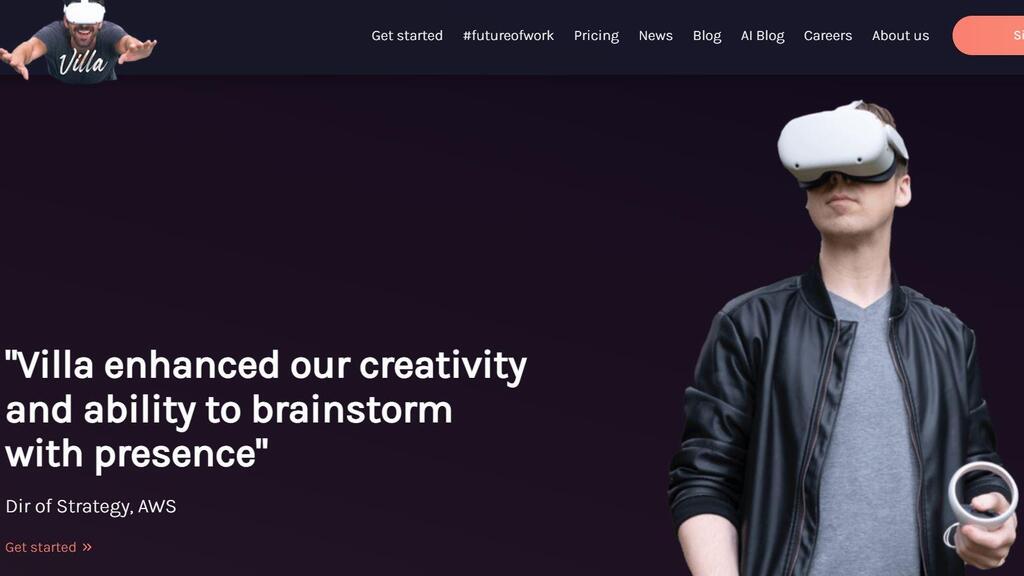An Israeli-American virtual reality startup company is making strides in the VR world, with ambitious plans to expand the field over the next 20 years.
With tech giants vying for a piece of the VR technology pie that is primed to take over our everyday lives, the Metaverse is the main arena where this conflict is set to unfold.
With this area being relatively virgin ground, the rules hadn't been set yet, and there's no guarantee that Meta, Apple, or Microsoft will the ones controlling the virtual reality industry.
Enter realvr.ai - headed by Israeli entrepreneur Ofer Baharav. His new 3D platform, Villa, has recently become one of the most sought after apps for the MetaQuest II VR headset, with close to half-a-million users to date.
An impressive feat, considering we're talking about a total of 10 employees from California and Israel, that have yet to launch their first crowdfunding campaign.
The aforementioned headset has its own app store, where you can download Villa for $10. Villa is already on the top 25 most popular apps on that store, and its popularity is on the rise.
"I fully believe that as three-dimensional creatures, our future is not in the 2D world we've become accustomed to, but the 3D world we're getting acquainted with," says 50-year-old Barahav.
Originally from Kiryat Tivon, a small town in northern Israel, Baharav has been residing in the Mecca of the global high-tech - Silicon Valley - for the last 15 years. The inspiration to go into the industry in the first place actually came from reading the novel "ForCognito" by Prof. David Passig. "He explains VR makes people smarter," says Baharav. "When I concluded my part as a CEO of a firm in Brazil, it was clear to me I wanted to move in that direction."
Additional inspiration for him and realvr.ai's co-founder Carl Jackson is the TV show Westworld, where humans arrive at a theme park to consort with life-like robots. "We made an app where the end user can be just like the founder of Westworld, creating any world he wants and open it to guests.
"Now, it's true that due to relatively low processing power, the interface is still somewhat crudely animated, but we believe that in the next 10-12 years it will look completely photo-realistic. That's our goal."
At 7,000 users strong, Israel is number one in the world in the percentage of Villa users relative to it population. That's why Villa features cities that are the digital twins of Jerusalem, Tel Aviv and Akko, as well as Denver and Melbourne. No New York and London. Yet.
Baharav likes to spend time "flying" around Jerusalem. "Being able to go to Temple Mount without anyone telling you to scram is quite awesome." If that's not your speed, you can always take hot-air balloon ride over Denver, for example.
While the scale of capital tech giants are pouring in to the VR world is huge, the fact of the matter is that it's still a niche area, with only 14,000,000 million headsets set to be sold this year. While that number is respectable on its own, when you compare it over a billion smartphones set to be sold in the same timespan, you come to understand the proportions at play.
Apple are set to unveil their own headset next year. "It will cost $3,000," says Baharav. "While only about 2,000,000 will be sold in the first year, it's going to make a statement nonetheless. VR is coming and the world needs to strap up."
At the moment, Villa is available to Meta and Pico headset users only, but will be introduced to Apple and Sony customers.
While 45,000 users use Villa every month, the VR experience isn't for everyone. The headsets are still clunky and heavy, and users report instance of nausea and dizziness after prolonged use. "We're establishing a web interface that will hopefully increase our audience, but some people find VR complicated and are just not into it."
Primarily designed for gaming, the MetaQuest II headset already has a "sister" headset called Quest Pro, designed for businesses and organizations. "At the moment, gamers make up the lion's share of VR activities, but organizations are next up. We want to increase the percentage of organizational users from 20% to 30% within the next two years."
This could really benefit the Israeli business landscape, where employers aren't too keen on people working remotely. "Human interaction is important," Baharav says. "There's only so much you can convey through text. That's where VR comes in. Zooming with 3-4 people is fine, but for more than that, you really need to see people in your space to get ideas across."
Yet another interesting product they're working on is AI-based avatars, like the aides found on the TV show Westworld. Baharav believes that AI interfaces can propel voice-activated virtual worlds. "Artificial intelligence is taking over. With content to accommodate the interface, there's nothing that can't be done."



